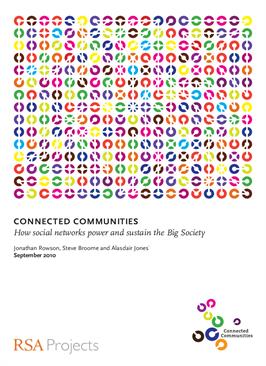To correct this error:
- Ensure that you have a valid license file for the site configuration.
- Store the license file in the application directory.
Traditional approaches to community development that define communities in solely geographic terms have severe limitations. These traditional approaches have failed to deliver on key social capital improvements such as improving trust between residents or fostering a greater sense of belonging. Our report argues for a new approach to community development – one that focuses on assets and recognizes the importance of social networks.
While we have strived to build a strong evidence base for our claims, researching social networks is an exacting process, and most of our findings should be regarded as indicative and exploratory, rather than representative and final.
In this report, we have deliberately selected parts of the analysis we have undertaken to date in order to illustrate the points we explore and put forward. Forthcoming RSA briefing papers will excavate the rich, complex data we have collected to analyse themes in more detail.
In this report, we argue for a new approach to community development, based on an understanding of the importance social networks play in influencing the social and economic prosperity of an area. This study uses the powerful diagnostic power of social network analysis; an approach which helps respondents as well as public sector workers to understand communities as a complex series of relationships.
This report recommends the following:
· Commissioners of public services should specify social network related outcomes as well as service specific outcomes.
· Commissioners of public services should protect and use the positive assets that currently exist within communities.
· The community engagement work that public services undertake should be designed so that it opens up the possibility of bridging capital being created.
· Wherever possible, interventions that are intended to improve our health or change our behaviour should be designed to allow for the possibility that their impact could be spread through networks and peer persuasion.
pdf 1.5 MB
Contributors



Related reports
-
The Community Footprint: shared value for business and communities
Businesses should act as ‘community hubs’, helping promote social interaction among their customers and developing local action plans to create happier, more resilient communities.
-
Communities Connected: Inclusion, Participation and Common Purpose
The government's planned reform of the health care system does nothing to combat loneliness and isolation amongst people who are most in need of support.
-
Power Lines
Recent efforts to build the Big Society have been too focused on citizen-led service delivery. Could nurturing people’s social networks provide a more effective approach?




Be the first to write a comment
Comments
Please login to post a comment or reply
Don't have an account? Click here to register.